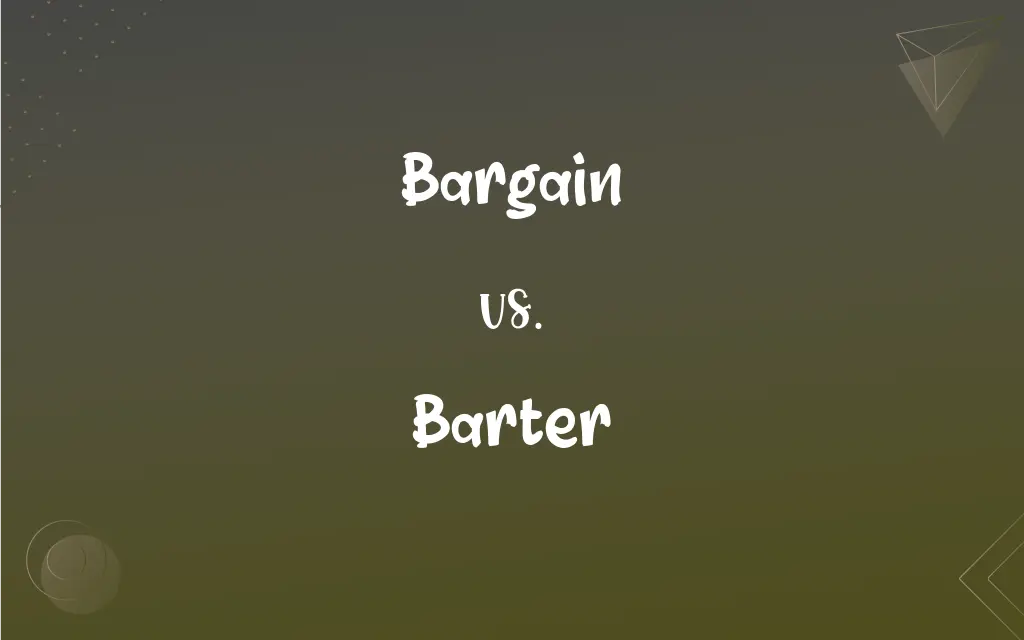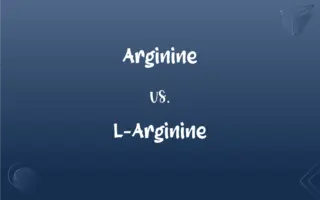Bargain vs. Barter: What's the Difference?
Edited by Aimie Carlson || By Harlon Moss || Published on December 14, 2023
Bargaining is negotiating the price of goods or services, while bartering involves exchanging goods or services without using money.

Key Differences
Bargaining involves negotiation to reach an agreeable price between buyer and seller, often seen in markets or sales. Whereas, bartering is the exchange of goods or services directly, without the intermediary of money, relying on the mutual value of the traded items.
In a bargain, money remains the medium of exchange, but the focus is on reducing the price to a level acceptable to both parties. In barter, goods or services are directly exchanged, and the value is subjectively agreed upon by the parties involved.
Bargaining can occur in any transaction where the price is not fixed, allowing for flexibility and negotiation. Bartering, on the other hand, requires finding a party that values what you have to offer and has something of value to offer in return.
The art of bargaining often involves tactics such as haggling, offering lower prices, or seeking discounts. Bartering requires a different skill set, focusing on assessing the value of goods or services and reaching an agreement on the exchange.
Bargaining is widespread in commercial transactions, especially in marketplaces and sales, while bartering is less common in modern economies but still exists in various forms, especially in communities or situations where currency is less prevalent.
ADVERTISEMENT
Comparison Chart
Medium of Exchange
Involves money
Does not involve money
Purpose
To negotiate price
To exchange goods or services directly
Common Situations
Markets, sales, negotiations
Communities with limited currency, direct trades
Skill Required
Negotiation tactics
Assessing and agreeing on value of goods/services
Economic Context
Common in modern economies
Less common, more prevalent in certain communities
ADVERTISEMENT
Bargain and Barter Definitions
Bargain
A bargain often refers to an item bought at a lower than usual price.
The sale offered many bargains, with items significantly marked down.
Barter
Barter involves trading items directly, based on mutual agreement of value.
In the barter system, he exchanged his artwork for musical instruments.
Bargain
Bargaining is the act of negotiating the price of a good or service.
She enjoyed bargaining at the flea market to get the best deals.
Barter
Barter is a form of trade where goods or services are exchanged instead of currency.
Bartering was common in ancient times before the invention of money.
Bargain
A bargain is a negotiated agreement where both parties agree to a reduced price.
He found a bargain on the laptop, paying much less than the listed price.
Barter
Barter can be used in communities where currency is less prevalent.
In the remote village, residents often bartered goods for services.
Bargain
A bargain can also mean a favorable deal that offers good value.
The all-inclusive holiday package was a real bargain for its price.
Barter
Bartering is the exchange of goods or services without the use of money.
They bartered fresh produce for repair services.
Bargain
Bargaining is a technique used to haggle for a better price.
During the car purchase, he bargained to reduce the final cost.
Barter
Bartering requires finding a party interested in exchanging their goods or services.
They bartered handmade crafts for vintage books.
Bargain
An agreement between parties fixing obligations that each promises to carry out.
Barter
To trade goods or services without the exchange of money.
Bargain
An agreement establishing the terms of a sale or exchange of goods or services
Reached a bargain with the antique dealer over the lamp.
Barter
To trade (goods or services) without the exchange of money.
FAQs
Can bargaining occur in any market?
Yes, especially where prices are not fixed.
Why do people bargain?
To reduce the price and get a better deal.
What does it mean to find a bargain?
It means to find an item or service at a lower price than usual.
Is barter common in modern economies?
It’s less common but still occurs, particularly in communities with limited currency.
Is bargaining acceptable in all cultures?
It varies; some cultures expect it, while others see fixed pricing.
What is bartering?
It’s exchanging goods or services without using money.
How do you initiate a barter?
By offering something of value in exchange for what you need.
What are the benefits of a bargain?
Savings and the satisfaction of getting a good deal.
Can you bargain in a department store?
Typically, no, as most have fixed prices.
What can be bartered?
Almost any good or service can be bartered.
How do you negotiate a bargain?
By offering a lower price and discussing terms.
Does bartering require equal value exchange?
Not necessarily; value is subjectively agreed upon by the parties.
Why is bartering less common now?
Due to the convenience and universality of currency.
Can services be bartered?
Yes, services are commonly bartered.
How does barter affect the economy?
It operates outside the traditional cash economy.
Can you bargain online?
Yes, especially on auction or classified ad sites.
Do people still barter in today's world?
Yes, especially in local communities or online platforms.
Is bartering a form of negotiation?
Yes, it involves negotiating the value of exchanged items.
Can anyone bargain?
Yes, with the right negotiation skills.
What skills are needed for bargaining?
Negotiation and communication skills.
About Author
Written by
Harlon MossHarlon is a seasoned quality moderator and accomplished content writer for Difference Wiki. An alumnus of the prestigious University of California, he earned his degree in Computer Science. Leveraging his academic background, Harlon brings a meticulous and informed perspective to his work, ensuring content accuracy and excellence.
Edited by
Aimie CarlsonAimie Carlson, holding a master's degree in English literature, is a fervent English language enthusiast. She lends her writing talents to Difference Wiki, a prominent website that specializes in comparisons, offering readers insightful analyses that both captivate and inform.







































































